We Must Renew Our Commitment to International Law
Both Hamas and Israel need to be held accountable to prevent further war crimes.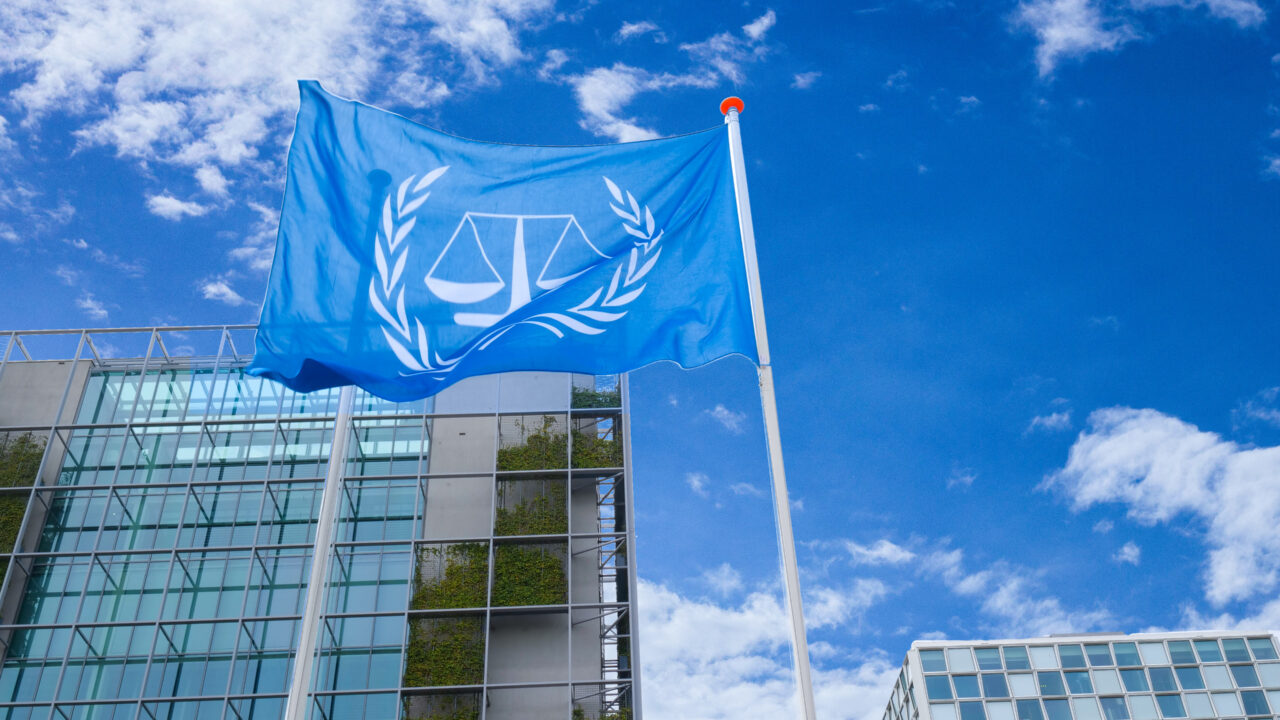 Image: Adobe
Image: Adobe
As the war between Hamas and Israel escalates and threatens to spread north to Lebanon, you may be wondering where international law stands amid the death and destruction. The short answer is it has been missing in action. As the latest round of bloodshed illustrates, in times of war, law is subordinate to brute force and vengeance.
This doesn’t mean that international law has become irrelevant. Far from it. In times of war, we need its counsel and wisdom more than ever.
As defined by Cornell University Law School’s Legal Information Institute, “international law consists of the rules and principles governing the relations and conduct of sovereign states with each other, as well as with international organizations and individuals. Issues that fall under international law include trade, human rights, diplomacy, environmental preservation, and war crimes.”
Judged by those rules and principles, both Israel and Hamas are guilty of horrific violations. Decades of Israeli occupation, de facto mass incarceration and apartheid, and scores of lethal military operations (including bombings of apartment buildings, refugee camps, and ambulances just this week) cannot be justified as acts of self-defense. But neither can wanton murders—including the intentional killings of civilians and reported instances of beheadings—and mass kidnappings be deemed legitimate acts of resistance by Hamas.
Under the leadership of Prime Minister Benjamin Netanyahu and the right-wing zealots in his cabinet, Israel has become a terror state. Hamas arguably is even worse. It has revealed itself as little more than an ISIS replicant, not only anti-Zionist, but viciously anti-Semitic to its core.
The problem lies not with the content of international law, but with its lack of enforcement.
Under the leadership of Prime Minister Benjamin Netanyahu and the right-wing zealots in his cabinet, Israel has become a terror state. Hamas arguably is even worse.
The contemporary framework of international law took shape after the Second World War with the ratification of the Geneva Conventions of 1949 and the subsequent amendments, or “protocols,” to the conventions. The post-war period also saw the founding of the United Nations, the ratification of the U.N.’s Universal Declaration of Human Rights, and the formation of the International Court of Justice (ICJ) as a forum for resolving disputes among nations.
Also known as the “World Court,” the ICJ sits in the Peace Palace, a regal red-brick Neo-Renaissance mansion that opened its doors in 1913 in The Hague, Netherlands. The court is the principal judicial organ of the U.N., and is the successor of the Permanent Court of International Justice, which operated under the auspices of the League of Nations from 1920 to 1945. Like its predecessor, the ICJ hears disputes between nations. It does not hear cases involving individuals.
Since convening its first trial in 1947, the ICJ has heard some 190 cases. Many involved boundary, aviation, and fisheries disputes, but a few have addressed weighty charges of genocide and human rights abuses in the former Yugoslavia, Iran, and Ukraine.
Unfortunately, only seventy-four countries have accepted the ICJ’s compulsory jurisdiction and agree to abide by its decisions. They include most of the nations of western and northern Europe. Russia and the United States are not among them. The United States withdrew from compulsory jurisdiction in 1985 after it was sued in the ICJ by Nicaragua for fomenting civil war and mining Nicaragua’s harbors.
The ICJ has considered two cases involving Israel and Palestine: In 2004, it handed down an advisory opinion, finding that the separation wall Israel was constructing along the West Bank violated international law. Currently, the court is reviewing a request from the U.N. for an advisory opinion on the legal consequences of Israel’s policies and practices in the occupied Palestinian territories.
Israel rejected the findings of the first ICJ advisory opinion. It will no doubt reject any adverse findings in the second opinion, if and when it is issued. Both the United States and Israel voted in the U.N. General Assembly against sending the second case to the ICJ.
Israel’s occupation of Palestine is also being investigated by the International Criminal Court (ICC), which began operations in The Hague in 2002 as a forum for trying individuals accused of committing war crimes, genocide and other “crimes against humanity.”
The ICC was founded after a 1998 conference in Rome attended by 160 nations. The conference produced an agreement known as the Rome Statute, which took effect in July 2002, establishing the ICC as the first treaty-based international criminal court for the purpose of investigating and trying individuals—both governmental and non-state actors—accused of genocide, war crimes, crimes against humanity and crimes of aggression, as defined by the Geneva Conventions, the Rome Statute, and other sources of international law. The Rome Statute authorizes the court to impose heavy jail sentences, up to life imprisonment, on those convicted.
Although the ICC is affiliated with the United Nations, it is legally independent. An agreement reached in 2004 permits the U.N. Security Council to refer cases directly to the ICC. The court is also authorized to conduct investigations at the behest of member states, or at the request of a non-member state that willingly submits to the court’s jurisdiction.
With no end to the conflict in sight, it’s easy—and indeed natural—to align with one side or the other. But that is a prescription only for continued carnage.
Today, 123 nations are parties to the Rome Statute, acceding to the ICC’s jurisdiction. Membership in the court and cooperation with the enforcement of its judgments are voluntary. Like the ICJ, the ICC has no police or arrest powers of its own.
Neither the United States nor Israel have ratified the Rome Treaty. As a result, they are not members of the ICC. The United States signed the Rome Statute in 2000 but withdrew from it in 2002. Russia withdrew in 2016. Palestine, under the auspices of the Palestinian Authority, not Hamas, joined the ICC as a recognized member state in 2015.
In 2019, the ICC opened an investigation into the alleged war crimes committed in Gaza and the West Bank. Both Israel and the United States have condemned the investigation, and it remains stalled.
In the meantime, Hamas has become increasingly extreme, sparking credible charges that its ultimate aim is genocide directed at all Jews.
To punish Hamas, the Israeli government has now imposed a complete blockade on Gaza, leaving Palestinian civilians without access to food, water, fuel, electricity, or sanitation. It is also now calling on 1.1 million people to evacuate Northern Gaza, in what seems to be preparation for a ground invasion. Jewish Voice for Peace calls the war an “imminent genocide of Palestinians.” More than 1,800 have already died in Gaza in this humanitarian crisis.
With no end to the conflict in sight, it’s easy—and indeed natural—to align with one side or the other. But that is a prescription only for continued carnage.
In the long run, as unavailing as it may seem at the moment, we have no other choice but to renew our commitment to international law, and demand that both Hamas and the right-wing government of Israel be held fully responsible and accountable for their crimes against humanity.
Your support is crucial…With an uncertain future and a new administration casting doubt on press freedoms, the danger is clear: The truth is at risk.
Now is the time to give. Your tax-deductible support allows us to dig deeper, delivering fearless investigative reporting and analysis that exposes what’s really happening — without compromise.
Stand with our courageous journalists. Donate today to protect a free press, uphold democracy and unearth untold stories.

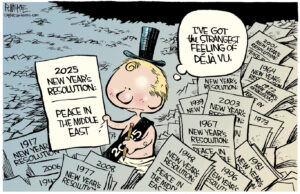
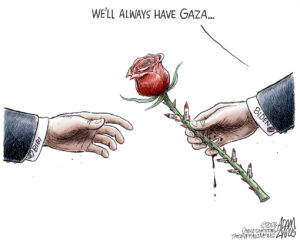
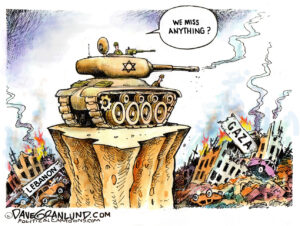
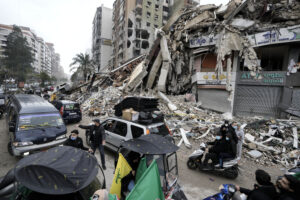

You need to be a supporter to comment.
There are currently no responses to this article.
Be the first to respond.